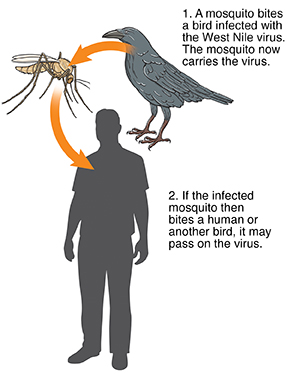A
B
C
D
E
F
G
H
I
J
K
L
M
N
O
P
Q
R
S
T
U
V
W
X
Y
Z
Back to Intro
Click a letter to see a list of medical procedures beginning with that letter.
Click 'Back to Intro' to return to the beginning of this section.
West Nile Virus
What is West Nile virus?
West Nile virus is an illness that mainly affects birds. But an infected mosquito can spread it to people and other animals. This happens after the mosquito bites a bird infected with West Nile virus and then bites a human. West Nile virus occurs all over the U.S. But most mosquitoes don't carry the virus. And most people who are infected never get sick. Older adults and people with weakened immune systems are more likely to have symptoms. These can range from mild to severe. There is no vaccine to protect against West Nile virus. The best way to prevent infection is to prevent mosquito bites.
How does West Nile virus spread?
West Nile virus is spread by mosquitoes. When a mosquito bites a sick bird, the virus settles in the mosquito’s saliva. It can then spread easily to the next person or animal the mosquito bites.

What are the symptoms of West Nile virus?
Most people with West Nile virus have no symptoms and never know they’ve been infected. Others have a mild illness called West Nile fever that lasts just a few days. West Nile fever seems like the flu, with symptoms that may include:
-
Fever.
-
Headache.
-
Muscle aches.
-
Tiredness.
-
Rash.
-
Vomiting or diarrhea.
West Nile virus is a concern because in rare cases the virus can invade your central nervous system. It can cause an infection or inflammation of the spinal fluid (meningitis) or brain (encephalitis). This can lead to brain damage or death.
How is West Nile virus diagnosed?
Your doctor will first ask about recent mosquito bites and look at your symptoms. If your doctor thinks you may have West Nile, a sample of your blood or spinal fluid is sent to a lab. It's tested for antibodies that the immune system makes against the viral infection.
How is West Nile virus treated?
There is no specific treatment or vaccine to prevent West Nile virus. Most people recover fully without treatment. Rest, fluids, and over-the-counter medicines for pain or fever may be used as directed. When symptoms are severe, hospital care may be needed.
How can West Nile virus be prevented?
The best way to prevent infection is to prevent mosquito bites. To do this:
-
If possible, stay indoors when mosquitoes are most active.
-
During mosquito season, wear socks and shoes, long-sleeved shirts, and long pants. Loose-fitting, light-colored clothing is best.
-
Apply mosquito spray or repellent to exposed skin. Spraying the outside of your clothing provides extra protection. Use a repellent that contains DEET. Or use one that has oil of lemon eucalyptus, which comes from plants. Always follow the directions on the label.
-
Don’t use DEET on infants younger than 2 months old. Instead, keep your baby indoors at dawn and dusk when mosquitoes are most active. And cover your child’s stroller or playpen with mosquito netting. Oil of eucalyptus is considered safe when used as directed. But don't use products containing oil of lemon eucalyptus or para-menthane-diol (PMD) on children younger than 3 years old. Never put insect repellent on a baby's or a child's hands, eyes, mouth, cuts, or irritated skin.
-
Don’t apply any type of repellent to children’s hands. (Young children tend to put their hands in their mouths.)
To help reduce mosquitoes in your yard and neighborhood:
-
Remove any outdoor items or trash that can collect water, since that's where mosquitoes breed. For instance, get rid of old tires, empty cans, and flower pots. Even bottle caps can be a breeding area for mosquitoes.
-
Change water in birdbaths at least once a week. Clean a pet’s outdoor water bowl every day.
-
Drain unused swimming pools and remove collected water from pool covers.
-
Clean clogged gutters.
-
Install or fix door and window screens.
-
Report any dead birds to your local or state health department.
Call 911
Call 911 if:
-
You have a severe headache.
-
You have a stiff neck.
-
You have loss of vision.
-
You have a high fever.
-
You feel confused.
-
You have uncontrollable muscle movements (tremors).
-
You're unable to move part of the body (paralysis).
When to contact your doctor
Contact your doctor right away if:
Online Medical Reviewer:
Chris Southard RN
Online Medical Reviewer:
Rita Sather RN
Online Medical Reviewer:
Sabrina Felson MD
Date Last Reviewed:
3/1/2024
© 2000-2026 The StayWell Company, LLC. All rights reserved. This information is not intended as a substitute for professional medical care. Always follow your healthcare professional's instructions.